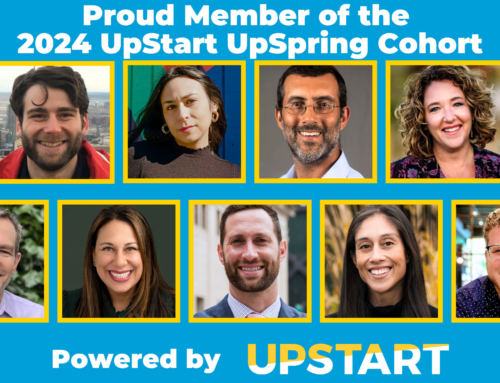eJewish Philanthropy | March 14, 2016
By Aaron Katler
Last week, UpStart closed applications for our 2016 Accelerator program, which supports innovative, early-stage organizations in becoming successful and scalable social ventures. In reviewing the submissions, we gleaned rich insight into today’s changing realm of Jewish innovation. Several distinct themes emerged from our analysis.
Increased demand from innovators for support to grow their ideas
UpStart saw a surge in applicants this year, more than doubling from thirty-one last year to sixty-six at this round’s closing. We believe that this dramatic growth is the result of over a decade of innovation funding, advocacy, and infrastructure-building. Entrepreneurs are more willing than ever to “give it a go” when they see the potential for validation of their work, and increased support to help them launch their endeavor. This means that Jewish organizations born out of the risks of entrepreneurship are no longer exceptions to the rule, but a growing segment of the Jewish communal landscape.
Growing alignment between Jewish innovators and traditional institutions
30% of UpStart Accelerator applicants – up 11% from last year – are professionals running innovative programs from within established Jewish organizations, such as Federations, JCC’s and Bureaus of Jewish Education. In our everyday work at UpStart, we increasingly see legacy institutions hiring for positions with “innovation” explicitly baked into their roles, not just their titles. These intrapreneurs represent the intersection of entrepreneurial culture and the traditional establishment, which UpStart sees as a powerful opportunity to drive change across our community.
Growth and maturation of the Jewish innovation ecosystem
Innovation is no longer a distinct sector, but rather a mature ecosystem of diverse organizations that are linked and networked together by their usage of a shared set of tools toward a common goal – opening up new access points to Jewish life. Increased demand for accelerator and incubator services, combined with a growing embrace of innovative services by establishment organizations, reveals a fundamental shift in the growth of the entire ecosystem.
These trends present a tremendous opportunity for UpStart, its strategic partners, and peer organizations to think creatively about how to empower these maturing networks of like-minded innovators, whether they are independent startups or disruptors inside traditional institutions.
One approach we’re considering is to provide support to emerging clusters of innovators within a given sector. For example, UpStart’s 2016 Accelerator application process saw enormous growth in applicants from the spirituality, advocacy, arts, and education fields. What would it look like to empower innovators from a specific sector – both entrepreneurs and intrapreneurs – with the tools and mindsets needed to drive change and collaboration?
One example of what this could look like is already apparent in the Jewish education space. For the last several years, UpStart has worked with both Accelerator organizations and legacy institutions to support innovators who are designing new models for youth education. Their success is indicative of the power of a rich innovation ecosystem:
- Accelerator organizations like Edah, Jewish Kids Groups, Jewish Enrichment Center, and Bayit joined together as part of the forward-thinking Nitzan Network, which emphasizes new approaches to afterschool programming and cross-sector collaboration.
- Organizations like the Paradigm Project (also an Accelerator participant) are bringing together a network of early childhood educators from North America and Israel to learn, grow, and create positive change in their schools. The Project sold out their second annual conference in just three weeks.
- UpStart and the Jewish Education Project recently completed the Day School Collaboration Network (DSCN) project, which supported fourteen New York day schools in using entrepreneurial tools and mindsets to better meet their constituents’ needs. Funded by UJA-NY, the DSCN empowered participants to devise solutions for generating deeper parent engagement, increasing their capacity to serve special needs students, and inspiring teachers to develop their visions for their schools. We are exploring similar initiatives in cities across the country.
In an era of alarming analysis of recent Pew Reports and vigorous debates over the drivers of Jewish vitality, the arc of the Jewish innovation story is optimistic and promising. We at UpStart feel great hope that market forces will continue to inspire new access points to the richness of Jewish culture, tradition, and practice, while the continued convergence of entrepreneurs and establishment organizations will yield a Jewish cultural “product” that is increasingly relevant, meaningful and in demand.
Aaron Katler is the CEO of UpStart, which partners with the Jewish community’s boldest leaders to expand the picture of how Jews find meaning and how we come together.
This article was originally published in eJewish Philanthropy.
Our purpose is to enable entrepreneurs to bring bold Jewish ideas to light. We help them reach Up to people in new ways that are meaningful, more inclusive, and create a brighter future for our Jewish community and the world we share.




